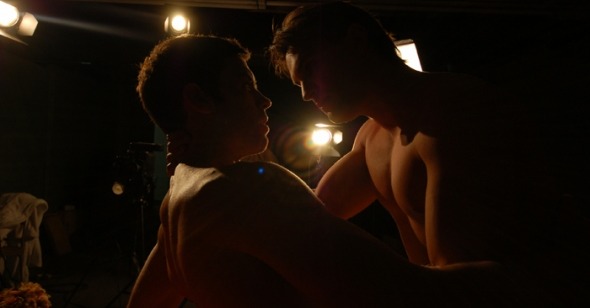Down the Hole
By Michael Koresky
Pornography: A Thriller
Dir. David Kittredge, U.S., Triple Fire Productions
A male-oriented reboot of Mulholland Drive, David Kittredge’s Pornography: A Thriller doesn’t lack for ambition. Straightforwardly titled yet bent to the max, Pornography is a shape-shifting, genre-twisting plunge into a nefarious sexual underworld that so envisions itself as a David Lynch film it might just qualify as having an identity crisis. Of course there are worse filmmakers one might see in the mirror, and Kittredge proves himself a steady, able study. That said, a constantly self-reflexive, endlessly looping, multicharacter thriller narrative geared up with all sorts of assaultive visual and aural tricks for a debut feature? Kittredge may have gone so far down his own rabbit hole he may never again see daylight.
This isn’t to infer there’s no pleasure to be gained from this hump-happy hall of mirrors. Kittredge’s whiplash-inducing turnabouts are so well placed and his discrete creeping mysteries so nicely paced that all of the increasingly wild identity morphs and resolution refusals go down surprisingly easy. For, despite the title, this is a film that rejects catharsis again and again—an elaborate, twisted denial of release. Naturally, many will find its approach, this epic form of cock-blocking, irredeemably unsatisfying. Yet the film is impressively committed to its own vision and logic, even if the whole picture might not end up quite as clear to the viewer as it does (one hopes) to Kittredge.
Pornography starts as an anti-nostalgic journey back to 1995, before the internet forever changed the dissemination of wank material. Amidst stacks of oversized videotape porn boxes, we meet scowling Mark Anton (Jared Grey, direct from the Wes Bentley school of dramatic arts), an adult film actor whose boy-next-door baby-face got him a modicum of attention, but who is now soberly trying to put his life on track, with a (never-seen) boyfriend, photography classes, and sensible spectacles. But when his photo teacher chastises his work—melancholy images of abandoned rooms with taglines like “This is the place I fear most” scrawled underneath—for lack of originality, we know that Mark needs to be shown how to see in new ways. Dragged back for one last mysterious, high-paying job—via a skuzzy porn producer, who, like all good noir catalysts, swills his whiskey in a dank backroom with dark wood paneling—Mark finds himself on the receiving end of a bizarre, intensely personal, videotaped interrogation session, the questions directed by a disembodied, out-of-room voice preoccupied with the interplay of illusion and reality (“Be real with us!” it menacingly growls). And just when we think we might start to have a handle on Kittredge’s vague porn-as-surveillance-as-exploitation hypothesis, the director pulls a spiffy trick, jumping fourteen years and suddenly picking up with a new cast of characters, a sweetly-in-love young gay couple, William (Walter Delmar) and Michael (Matthew Montgomery, the film’s most appealing performer), the latter of whom is researching for—ta dah!—a book on the history of gay pornography.
It’s not the last time Kittredge will purposely play with and confound our perceptions and expectations. As the film continues, the palpable world of the movie at hand shifts and stretches like taffy, making room not only for the sad tale of Mark Anton (which might just be an urban legend) and the ever-more lurid pursuits of Michael but also a third major character, dissatisfied porn star Matt Stevens (Pete Scherer, who looks like Entertainment Weekly pundit Dave Karger with a hard-on), whose own downward spiral forms the crux of the stories. Matt may in fact be the guiding force all along. After all, it’s his goofily sincere interview that begins the film, in which he offers a treatise on skin flicks’ ability to “make fantasies come alive.” It’s a mood-setter surely indebted to wannabe starlet Betty’s early exclamation “I’m in this dream place!” in Mulholland Drive.
If only the comparisons could end there. Alas, Kittredge never fails to thickly lay on the Lynch. Intermittently, he turns to Eraserhead (an interlude with an angel singing under a spotlight on a cabaret stage, in this case a boy in briefs and wings), Blue Velvet (characters disappearing from the frame), Inland Empire (a confrontational, climactic “escape”), and, of course, mucho Mulholland, from an oft-seen ring, perched on a tabletop like the earlier film’s key talisman, to nightmarish hulking ogres lurking in dark corners, to shadowy nightmarish interstitial voice-overs of lines such as “All you have to do is wake up.” Of course, Lynch also never writes dialogue scenes that flatly spell out his films’ underlying philosophies as does Kittredge, as in an early scene between Mark and a fellow photo classmate with a puppy crush having an decidedly ontological discussion.
If only Kittredge seemed to be having more fun with the material. DePalma has turned this stuff—films within films and dreams within dreams—into fleet, pleasurable joyrides, with nary a hint of morbidity. Pornography: A Thriller is a mostly morose business. Its expertly tailored sound design (which includes some truly disturbing effects) and clever, seamless interweaving of different filmmaking styles (each of the film’s overlapped segments is distinct in cinematography and editing) seem to largely be in the service of an ill-conceived cautionary tale that repurposes the adult film industry as a series of nightmares begetting nightmares, a fairly conservative tack, even if inadvertently. “The nature of desire demands the new,” Michael hypothesizes at one point, and while narratively Pornography: A Thriller surely offers something out of the ordinary, Kittredge should have listened to his own character’s words and created something other than another excoriation of exploitation.
